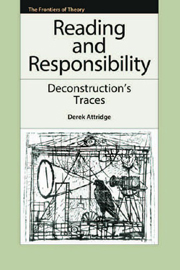Book contents
- Frontmatter
- Contents
- Acknowledgements
- Series Editor's Preface
- Introduction
- 1 Derrida, Deconstruction and Literary Criticism
- 2 Deconstruction Today: Literature, Postcolonialism and the Secret
- 3 Following Derrida
- 4 The Impossibility of Ethics: On Mount Moriah
- 5 Arche-jargon
- 6 Deconstruction and Fiction
- 7 Posthumous Infidelity: Derrida, Levinas and the Third
- 8 Roland Barthes's Obtuse, Sharp Meaning and the Responsibilities of Commentary
- 9 Nothing to Declare: J. Hillis Miller and Zero's Paradox
- 10 Radical Atheism and Unconditional Responsibility
- 11 The Place of Deconstruction: A Conversation with Jean-Michel Rabaté
- Bibliography
- Index
Introduction
Published online by Cambridge University Press: 12 September 2012
- Frontmatter
- Contents
- Acknowledgements
- Series Editor's Preface
- Introduction
- 1 Derrida, Deconstruction and Literary Criticism
- 2 Deconstruction Today: Literature, Postcolonialism and the Secret
- 3 Following Derrida
- 4 The Impossibility of Ethics: On Mount Moriah
- 5 Arche-jargon
- 6 Deconstruction and Fiction
- 7 Posthumous Infidelity: Derrida, Levinas and the Third
- 8 Roland Barthes's Obtuse, Sharp Meaning and the Responsibilities of Commentary
- 9 Nothing to Declare: J. Hillis Miller and Zero's Paradox
- 10 Radical Atheism and Unconditional Responsibility
- 11 The Place of Deconstruction: A Conversation with Jean-Michel Rabaté
- Bibliography
- Index
Summary
At the outset, it seems appropriate to ask why I wrote this book and why anyone should want to read it.
There are two answers (at least) to the first question. The chapters that make up the volume were all initially responses to invitations – to give a talk, contribute to a collection, participate in a dialogue. I hope they retain the sense of direct address and of focus on a specific issue that marked their original production, even though they have been revised and in some cases considerably expanded. The other answer is that they trace a constant engagement with the work of Jacques Derrida over nearly two decades and reflect an interest in that work going back a further two decades. They thus exemplify a set of responses to or elaborations of Derrida's writing, registering a few of the many ways in which it remains productive for our thinking about literary questions today and about culture more generally. To use Derrida's own metaphor, they are my counter-signatures to his signature: attempts to affirm what is singular about his writings in a manner that does not simply repeat them but brings to bear on them my own peculiar situation, individual history and distinctive knowledge and interests.
Information
- Type
- Chapter
- Information
- Reading and ResponsibilityDeconstruction's Traces, pp. 1 - 14Publisher: Edinburgh University PressPrint publication year: 2010
